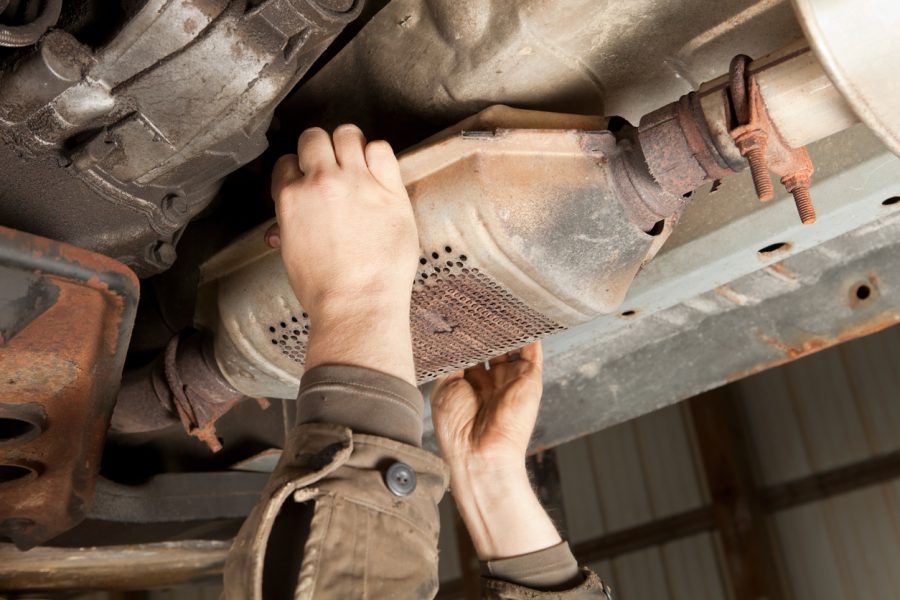
The Catalytic converter or ‘cat’ is a standard part of every modern car’s exhaust system. It helps to reduce harmful pollutants in the engine’s fumes. But thefts of catalytic converters are increasing dramatically.
In 2019, reported thefts of cats rose to 13,000 throughout England and Wales – up six times on the previous year. It’s not cheap to put right either. Replacement catalytic converters cost anywhere between £500 and £2500, depending on the car. Read on to find out if you could be at risk.
What is a catalytic converter?
The cat lives in the exhaust pipe and contains a honeycomb that’s coated in various metals. When the harmful gases generated by the engine burning fuel pass over these, a chemical reaction takes place. This converts carbon monoxide, nitrogen oxides and other hydrocarbons into less poisonous gases such as carbon dioxide and nitrogen.
Why are catalytic converters worth stealing?
The metals used in catalytic converters include platinum, palladium and rhodium. These are considered to be precious metals and as such sport a hefty price tag. In November 2020, rhodium’s market value was £9126 per ounce. Palladium sells for £1892 per ounce while platinum is a mere £688 an ounce. If the metals can be sold for that sort of money, stealing them is clearly worth the risk.

How are catalytic converters stolen?
There’s nothing subtle about catalytic converter theft. Since the precious metals are hidden deep inside the cat, the easiest way is simply to cut the entire system out of the exhaust. They can then be dealt with elsewhere.
Most cat thieves are well organised, turning up with a trolley jack to lift the car up and either an angle grinder or hydraulic cutters like the fire brigade uses to cut into crashed cars. This enables them to get the precious cat off in seconds meaning they’re not fussy when and where they operate. Unmonitored car parks are a favourite but they also operate in residential streets during broad daylight.
Which cars are most at threat?
The most popular cars for cat theft are older petrol-electric hybrid models. This is for two reasons. Older cars use more precious metals and their catalytic converters are often easier to get to.
As the catalytic converter cleans up the gases going through it, the fewer gases it has to deal with, the cleaner it will be. And the less used a catalytic converter is, the easier it will be for thieves to get to the precious metals. They look for hybrids because these cars have battery powered motors that work alongside or instead of their petrol engines. This means these cars have fewer fumes passing through the cat.
Cars that thieves have targeted are the Toyota Prius and Auris, Lexus 400h and Honda Jazz.
Can you protect against it?
The most obvious way to protect your car from cat theft is to garage it or put it in a car park that’s monitored by CCTV. Some advice is to reverse into parking bays so that thieves can’t attack it from the rear. But most get under the car from the side.
You could fit a Catloc. These are devices designed to protect catalytic converters. They are fitted as standard to some Mercedes vans and can be fitted to the Toyota Prius. However, these are model specific and not all cars are supported.
How do you know if your cat has been stolen?
When you fire your car’s engine up, it will probably sound like the noisiest, roughest tractor you’ve ever heard. This is because the exhaust pipe’s silencer will have been destroyed when the cat was removed.
Who is stealing them?
Assistant Chief Constable Jenny Sims, car crime lead for the National Police Chiefs’ Council (NPCC), confirmed: “There is a link to serious organised crime. The people taking catalytic converters know exactly which cars to target, where to find them and how to get the cats off quickly.”
This was backed up by Catloc, a company that makes equipment to protect catalytic converters. Operations manager Dave Lees said: “Victims have had guns pulled on them, knives, physical threats.
“We’ve heard of people having them nicked while they’ve been in hospital car parks. There was even a private ambulance company that had the catalytic converters taken from its vehicles during the first COVID outbreak in 2020.”
Is a 20 year old pergoet d I danger of being robbed for a catalyst converter?
Is this covered by comprehensive insurance claims?
Helpful article . Sadly I have no choice but to park on the street outside my house ( when there is space ) . Hope my Nissan Note is not a target .
Thank you, a very interesting article.
Why can’t the police monitor the scrap yards
Thank you useful info and advice.
Thankyou green flag putting mine in garage.
I wanted to see a league table of `stolen catalytic converters`, why isn`t there one so I can see how likely my `cat` is to be stolen.
Who buys the cat scrap dealers should be fined for buying them
VERY INFORMATIVE WILL TAKE MORE CARE WHERE I LEAVE MY CAR PARKED THANKS